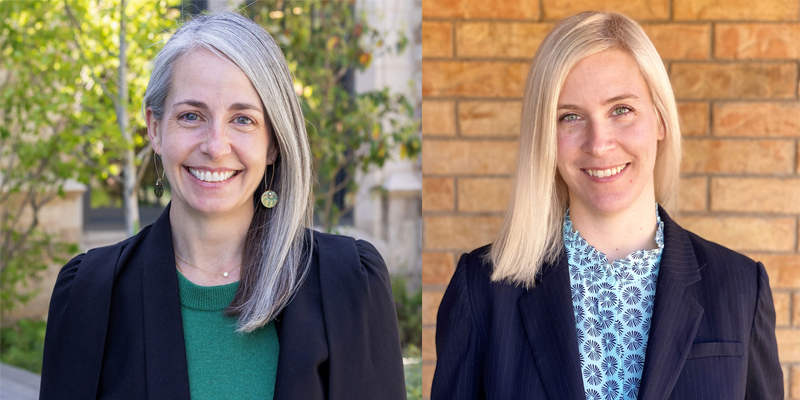The growing importance of sustainability in business

As Loyola University Maryland celebrates Earth Month, two professors at Loyola’s Sellinger School of Business define and discuss sustainability and its growing importance to organizations, different business disciplines, and the planet. Stacy Chavez, Ph.D., assistant professor of accounting, and Astrid Schmidt-King, J.D., teaching assistant professor of management and organizations, specialize in sustainability management, corporate social responsibility, sustainability measurement and reporting, and international business.
What is sustainability? Why is it important?
Chavez: Sustainability can be defined in many ways depending on the context. Business sustainability refers to the ability of an organization to survive and prosper into the future. More commonly, and especially important during Earth Month, sustainability refers to the longevity and ability for the people and the planet to survive, to use only what we need to preserve the future.
It is not possible for one person alone to act in a way that will sustain our world for future generations. The more we know about how to be a better global citizen, be it recycling and reducing waste or simply seeking knowledge about how our actions have a domino impact on the world, the more of a positive force we can be.
Why must organizations work toward sustainability?
Schmidt-King: Sustainability exists at many levels: individual, organizational, societal, and global. Not only are organizations, firms and businesses positioned to be agents and engines of innovation and impact, but a sustainable future is a prerequisite for their own survival. Given the scope, reach and operations of businesses, they can create and adopt sustainable business practices that serve and support their business and stakeholders, including the well-being of the ecosystem. Organizations are realizing that doing well and doing good are not mutually exclusive terms. Businesses can find the balance to do both and, in doing so, can be leaders in sustainability.
What are the different kinds of sustainability?
Schmidt-King: Sustainability is a broad term, which can be a challenge and opportunity. In 2015, the United Nations created 17 Sustainable Development Goals focusing on the dimensions of sustainability including people, planet, prosperity, peace, and partnerships. For businesses and organizations, this has translated into terms like the triple bottom line – PPP for people, planet, and profit and ESG for environmental, social, and governance – and calls upon businesses to see their role and responsibility in advancing sustainable strategies and sustainable development. Our sustainability management major at the Sellinger School of Business views sustainability as “how corporations deliver value to people, planet, and profit while creating and sustaining a competitive advantage.”
How do different business disciplines support sustainability?
Chavez: All business disciplines have a role to play in supporting sustainability. Examples include considering green companies or initiatives in financing and investing decisions, proper messaging and handling of sustainability initiatives to prevent greenwashing or misleading claims, and accounting to help with measurement, assurance of information, and presentation of data.
Schmidt-King: McCormick & Co. and Pompeian Olive Oil visited Loyola to speak to our students about their organizations’ integration of sustainability into their business practices and strategies. From management, to marketing, to collecting and assessing data, to reporting, to understanding global trends in areas such as climate and geopolitics, sustainability requires collaboration not only across disciplines, but also across organizational divisions.
How do organizations measure and report on sustainability?
Chavez: The world of sustainability reporting is like the Wild West. Companies may feel pressure from their stakeholders – investors, customers, employees, etc. – to report on certain activities, or they may report based on their mission or ethics. Unlike financial reporting, sustainability reporting is not yet universally mandated or prescribed, so companies have some autonomy as to what topics they choose to report on, how often they report, which published guidelines they use to measure their impact, and the format of their reporting. We are beginning to see mandated emissions (GHG) disclosure proposals, which is the first step in moving towards more uniform reporting on sustainability.
How does sustainability follow the Jesuit commitment of “caring for our common home”?
Schmidt-King: Laudato Si’ is the name of Pope Francis’ encyclical on caring for our common home, planet earth. It calls to action “every person living on this planet” and calls for an integral ecology that sees the interconnectedness of environmental, economic, political, social, cultural, and ethical issues. In 2021, Loyola University Maryland joined the first cohort of Laudato Si’ universities, committing to responding to the cry of the earth and the cry of the poor through fostering ecological economics, adopting sustainable lifestyles, fostering ecological education, fostering ecological spirituality, and building community resilience and empowerment.
Why should students study sustainability?
Chavez: Students should study sustainability because it is quickly becoming ingrained in the corporate world. Having knowledge of the vocabulary, reporting frameworks, specific industry impacts, etc., will help students succeed and contribute to their chosen path. For instance, the accounting industry expects that Loyola’s current freshmen in the Class of 2027 will be involved in auditing sustainability information in their first year of employment. The focus on sustainability is growing in all facets, so it is imperative that our students know the issues.
Schmidt-King: Not that long ago, sustainability was something extra a business would consider. Now it is integral and ingrained in an organization’s strategy and operations. I am proud that Loyola University Maryland was the first institution in Maryland to create a sustainability management major. It is a path that allows students to do well by doing good, and it provides a career path that highlights the critical role of businesses in effectuating meaningful change.
Loyola’s Sellinger School of Business introduced the Bachelor of Business Administration in sustainability management in 2020. On the graduate level, Emerging Leaders MBA students participate in a sustainability colloquium that addresses the question, “How do competent, credible, confident emerging leaders contribute to sustainable value creation for all stakeholders?” Colloquium participants earn a certification in ESG reporting.